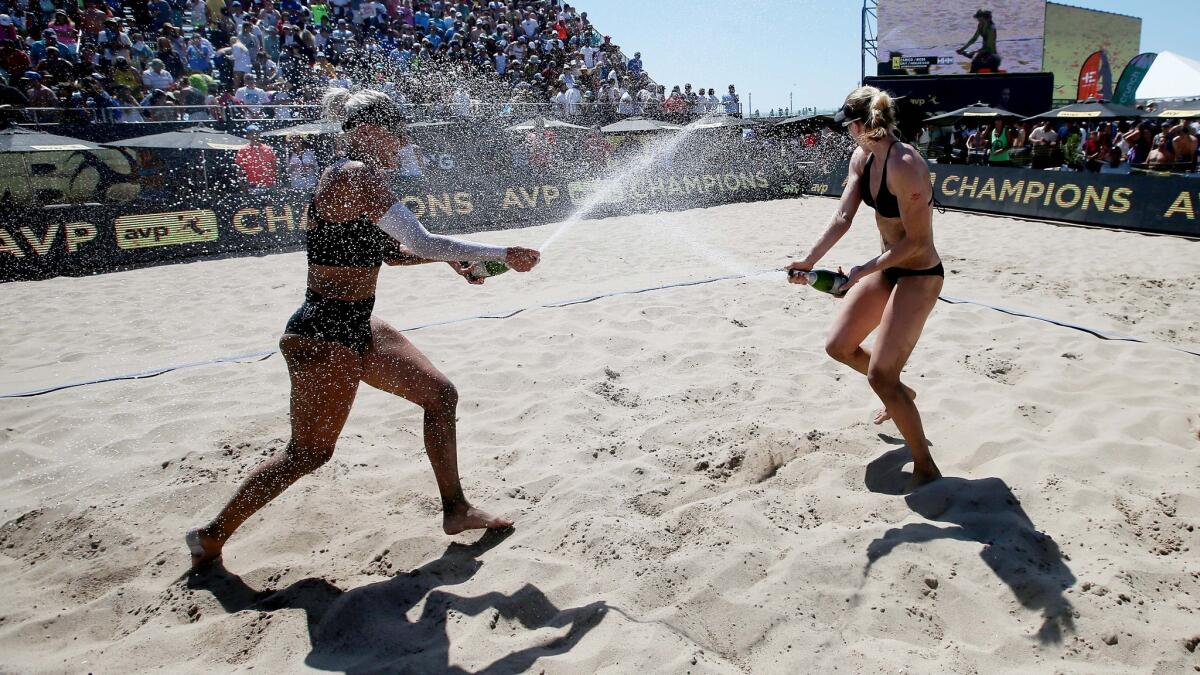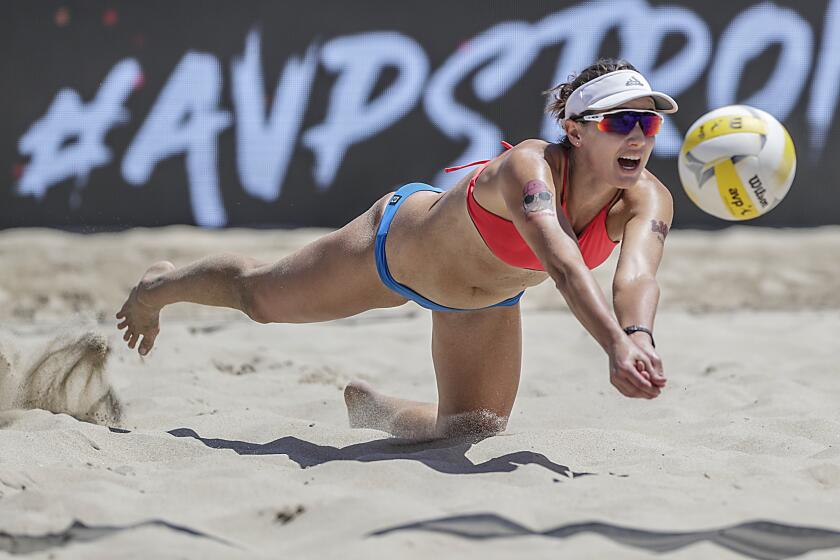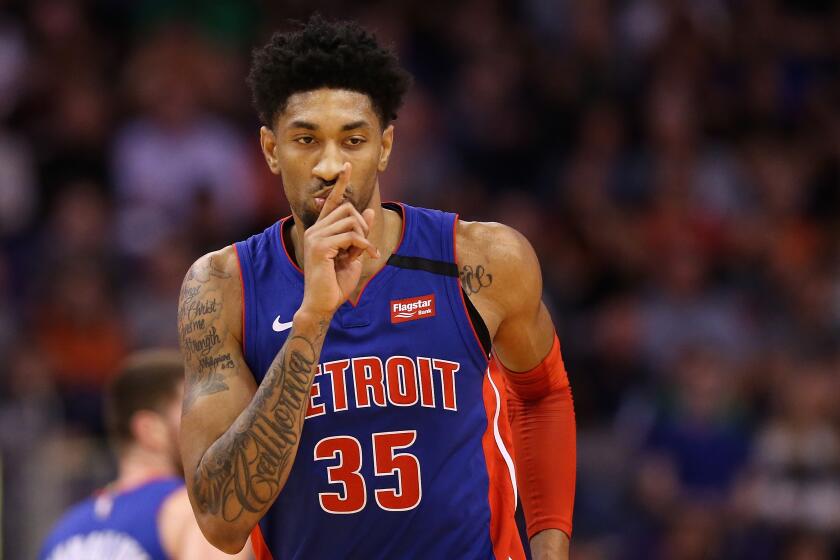Olympic beach volleyball qualifying events postponed because of coronavirus pandemic

- Share via
Two key Olympic beach volleyball qualifying events were postponed Saturday because of concerns over the global coronavirus pandemic, leaving several U.S. athletes frustrated at a seemingly slow decision-making process and shrouding Olympic qualification in sudden uncertainty.
A day after FIVB, the international governing body for indoor and outdoor volleyball, announced it was largely keeping its upcoming beach volleyball schedule intact to be evaluated on a “case-by-case” basis, the federation reversed course Saturday afternoon.
First, it postponed an event in Cancun, Mexico, that was scheduled for March 24-29. Hours later, it also postponed a tournament in Gold Coast, Australia, that was set to start Wednesday — an announcement that came after most U.S. players had already withdrawn from the event on their own accord, but not before several other Americans who were still planning to participate had already arrived in the country.
One U.S. player was sitting on the tarmac at Sydney International Airport when word came down, waiting for a connecting flight to Gold Coast to take off.
“It’s just a big bummer that [the decision] came this late,” said Emily Day, one of the U.S. players who decided to withdraw from the Australian event Friday. “I feel so bad for the athletes that are already over there or en route. … I believe it’s the right decision, but it doesn’t take away from the fact of how much it just stinks.”
A group of U.S. beach volleyball players has withdrawn from an Olympic qualifying event in Australia next week because of the coronavirus pandemic.
Now, FIVB’s Olympic qualifying process is unclear. In one of its statements, the federation acknowledged that “it is likely that there will be further changes to the beach volleyball calendar,” and said it “is in contact with the [International Olympic Committee] about potentially revising the beach volleyball qualification system for the Olympic Games Tokyo 2020.”
It’s the decision many U.S. players were hoping for all along. They only wish that — like other U.S. sports leagues that elected to suspend or cancel their seasons as early as Wednesday or Thursday — FIVB’s decision had come much sooner.
“I’m glad they did it, but typical FIVB,” said Theo Brunner, another U.S. player who had previously withdrawn. He added: “I think all the players getting upset had something to do with it, hopefully. It’s still ridiculous they had people fly out there.”
The news Saturday came at the end of an already exhausting week for many top U.S. players, most of whom had to decide whether to travel to Australia well before FIVB postponed the event.
“It felt like we were brushed over,” said Betsi Flint, a Los Angeles-based player who described the decision on Instagram as choosing between, “Social Responsibility or Olympic Points?”
By Saturday morning, six total teams of two, including three-time Olympic gold medalist Kerri Walsh Jennings and her partner Brooke Sweat, picked the former. Many of them made the decision in unison, consulting in person and over the phone after FIVB initially confirmed to proceed as planned Friday.
The suspension and cancellation of sporting events around the world in the wake of the coronavirus pandemic has hit sports books in Las Vegas hard.
“It’s hard because as athletes we want to play,” Flint said. “We’ve been working really hard since the beginning of the season. So it’s really hard to resist. … We almost feel pressured to go because it’s there and there are Olympic points on the line.”
Added Day: “The nature of our sport is, if one American team doesn’t go, that’s a great opportunity for the next American team to go and compete and get more points. So it’s brutal because it’s somewhat of a selfish sport in that aspect. But then there are all these other risks.”
In a statement, FIVB said the decision to reschedule the Australian event was made in recognition of “international travel limitations and other restrictions in different parts of the world that impact the ability of some of the participants to take part in the event. The health of athletes, officials and fans is the FIVB’s top priority, and the mutual decision to postpone the event was made in the best interests of all parties.”
Not all of the U.S. players are so sure.
“I’m sure they weren’t planning on doing anything,” Brunner said. “Then all the players were very annoyed by it. A bunch of players canceled at the last minute. And they were like, ‘Oh crap, we have to do something.’ ”
The American athletes are now left to wonder how Olympic berths will be determined. The beach volleyball Olympic qualification season was planned to run until June 15, at which point the top 15 teams (factoring in an Olympic-mandated maximum of two per country) in FIVB’s qualification standings would secure a spot in the 2020 Games.
Of the six teams that withdrew from the Australian event Friday, only Walsh Jennings and Sweat were in a qualification spot.
Detroit power forward Christian Wood is the third NBA player to test positive for the coronavirus, which brought the NBA to a halt this week.
The U.S. players did recognize the complex situation in which their sport finds itself. Unlike the NBA or Major League Baseball, FIVB has to coordinate between hundreds of member countries who are all reacting to the COVID-19 outbreak differently. And for every event eliminated, so too is an opportunity for players to earn money and accumulate points.
“Our rankings, our points, it’s how we make a living,” Brunner said. “So I don’t blame anyone who chose to go. Everyone has to support their families, make their own decisions. It’s tough and that’s the calculus a lot of people are making.”
The players just want to see those choices made in a more timely, thought-out manner.
“We have some time now until the next FIVB tournament occurs,” Day said. “Which is nice so that people can sit down and players, coaches, federations can all give their input as opposed to rushing to a rash decision as to what’s going to happen.”
More to Read
Go beyond the scoreboard
Get the latest on L.A.'s teams in the daily Sports Report newsletter.
You may occasionally receive promotional content from the Los Angeles Times.









